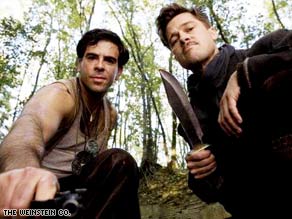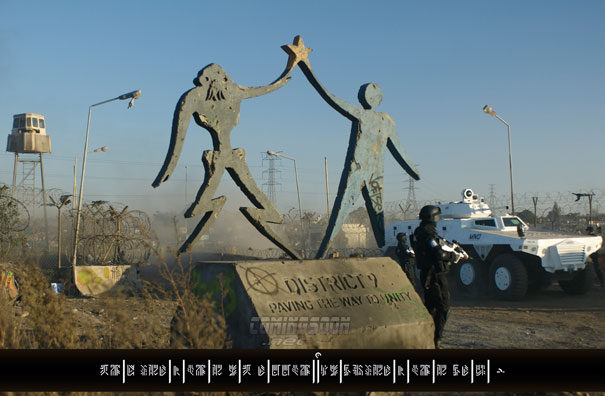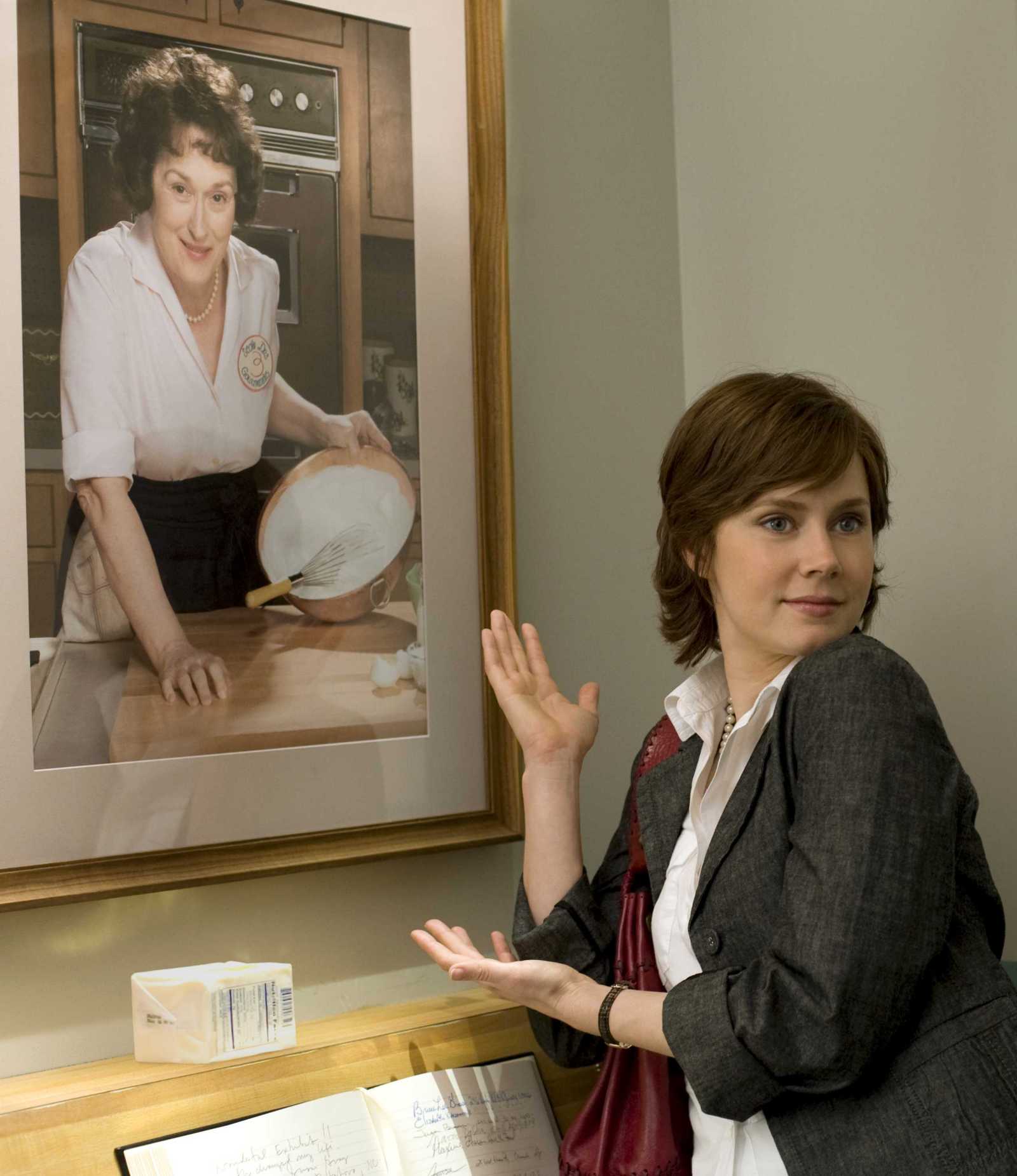
Ang Lee is a director who likes to immerse his films completely in a time and place. Whether it's suburban Connecticut in the '70's (
The Ice Storm), classical China (
Crouching Tiger), or the '60's West (
Brokeback Mountain), he wishes to capture not only the scenery, but the feeling - the essence, if you will - of being in a specific moment in time, in a specific landscape.
His films are also about sexual awakening - whether the awakening is naive and dangerous (
Ice Storm), furtive and repressed (
Brokeback Mountain)
, or symbolically coded Freudianism (
The Hulk), he's seemingly fascinated with the roles between parents and children and the fraught sexual tensions of adolescent transformation into adulthood.
It's perhaps inevitable, then, that Lee would eventually gravitate towards filming the biggest cultural moment of sexual and adolescent awakening in our collective memories: Woodstock, that late-Sixties concert on Yasgur's farm that became synonymous with a generation's blossoming into sexual freedom.
Yet this is not the straight-on Woodstock movie that many might expect, that a director of realism like Ron Howard or of moral drama like Spielberg might make. There is little of the music, none of the performers - nothing, in fact, of the "subject matter" of the concert itself. What Lee wishes to focus on is the experience - the feeling - in fact, the meaning, of Woodstock, not only to the thousands who attended but to an entire generation, more than anything else. Lee goes so far deeply into the meaning of this moment that what he creates is a supremely "laid back" film - a film with a breezy style and subtly of drama that seemingly might have even been made in the Sixties, but with such awareness and fullness of the moment that it could only have been made from our present perspective.
Taking Woodstock centers on a particular man/boy, if you will, played with halting charm by the young comedian Demetri Martin. Martin is Elliot Teichberg, the dutiful, industrious, creative son of two bat-shit crazy Jewish hotel owners in the Catskills who are going broke in their lazy, run-down old town. (Elliot's mother, an Eastern Europe refuge who looks a bit like a drained beet, drives away customers by charging for towels and showers, berates the banker who's about to foreclose on their property, loves shooing the hippies renting their barn back inside whenever they pop out, and is an eternal albatross and embarrassment to Elliot. Meanwhile, Elliot's father is a thoroughly defeated roofer who lets Mom run the boy around.). This is the story of Elliot, how he ends up bringing the concert to his town, and how the concert transforms Elliot - a buttoned up Jewish intellectual with hidden drives and tender obligations - from a divided, unhappy soul into a fully actualized, integrated human being.
That's pretty much the plot of the film, and as with his movie
Brokeback Mountain, the pace of
Taking Woodstock is slow and easy, the main character is a gay man (only this time, one who finds comfort in discovering who he is), and Lee is more concerned with building metaphor and moments of beauty than creating drama and tension (this film couldn't be more opposite to something like Tarantino's
Inglourious Basterds.) I'm afraid all this may make it a bit unpopular for certain theater goers. (Exiting the film, the people behind me said, and I quote: "What happened? Nothing. It was gay. That's all that happened." Then again, I saw it in New Jersey.)
I too was a bit bored during the movie. Lee uses a split screen (as he did in
The Hulk), a technique that was too clever by half in
The Hulk and which seemed, at first, discredited here (the reason for it I'll explain in a bit). It bothered me, as did a beefed up Liev Schreiber in wig and dress playing an ex-Marine drag queen, the corny little breaks in character (like a cop with a flower in his helmet) and the sometimes slow scenes of spaced-out dialogue. Yes, like many, I wished Lee had used more of the music of the festival to punctuate the soundtrack (were the rights unavailable, or was this a conscious decision?). I sat through the film not sure what I thought about it. But as I left the movie, and as it sat with me, it grew and grew - seeing it was like taking a pill, and as the memory of the movie flowered inside me, it increasingly left me with a good feeling. Finally, as I fully realized how Lee's symbolism had worked throughout, how well he had touched upon a critical moment of adolescence, I realized that a movie hasn't made me feel this good in ages. Lee had done something much much more than simply shoot a boring movie about a gay boy's peripheral view of Woodstock. It's like taking a little bit of the Sixties with you.
How he does that is actually quite complex, and what a director like Lee is so brilliant at is creating layers of metaphor. He does that here and it's just not apparent how so until the movie is over. But start at the opening scene: a shot of flowers growing in the decaying, ordinary landscape of the Teichberg motel, and the empty pool. This landscape is Elliot's landscape. There are flowers growing (Elliot is a painter) but the life is drab and dull. The pool is empty. Lee has chosen these metaphors - flowers and water - because this is Woodstock, a cultural moment about sexual blossoming, and the age of Aquarius.
As the people of Woodstock come to town, the pool becomes full - first to bathe in, later to drink. Elliot begins to become more of himself as he bathes in their almost extra-terrestrial glow, and he begins to use his entrepreneurial skills to help organize the concert promoters, to convince his parents and to fight the hostile townspeople. The character of Michael - the lead promoter, who once lived on Elliot's street - is handsome, virile, laid-back, chilled, and completely actualized. He's the dream of what Elliot could be (he even comes riding in on horseback at one point): a combination of a creative soul with business smarts and leadership...the perfect Aquarian.
But Elliot is divided - clearly evident in his paintings, which all exhibit dark and light swatches intersected by a single bright color. In fact, much of this movie is divided into Yin and Yang: there are the two townie brothers, one the uptight older fisherman, the other the war-ravaged whacked out wild soul. There's Elliot's mother and father, who have reversed roles, with the mother dominating and the father shy and shut down. And there's the motel itself - which has both a barn, in which live the Earthlight Players, a communal, semi-naked, pansexual chorus of free thought and love, and the main motel, in which live Elliot's uptight, hostile, repressed parents. The parents, like Freud's ego, must keep the naked players inside the id of the barn. But Woodstock is about letting all that free love energy out...by the millions.
This is why the split screen technique ultimately makes sense: like Elliot, the film is split between repression and freedom, and is about breaking down that barrier through the crucible of the concert (it's also apparently a direct tribute to the Woodstock documentary, which
used the same technique). The character of Vilma - Liev Schreiber's drag queen - shows up as the hotel bodyguard, as the first embodiment of that mixing: a hard man and soft woman in one person. But the real mixing happens the first day of the concert, when Elliot is sent "to the center of the universe" by Vilma and his father. What he encounters when he gets to the concert isn't the concert itself but a van, where sits a hippie from California and his chick. The two spot Elliot and immediately deduce that "he's thirsty." He is thirsty - for the age of Aquarius - and they offer him wine, and ultimately seduce him into the van, where he's given a tab of acid. What comes next is probably the most delicately created, insightful, and accurate representation of a drug awaking experience ever put onto film. As Elliot lies in the van, seduced by both the man and the woman, the mandala paintings around him begin to move, swirl, and mix. This is the beginning of the journey to dissolve the dualism, to mix the Yin and Yang of the movie's themes.
When Elliot finally emerges from that van, he's a new man: literally dressed now in the relaxed garb of the Sixties, he goes to a hill to look at the concert with his new friends. What he sees becomes an entire ocean of people, a moving, rolling sea, with the center of it the light of the concert, blossoming and exploding like a verdant flower. This: this moment of sexual awakening, this moment of self actualization and integration - this, Lee is saying, is the center of the universe. But this is not just Elliot's story: this is a story of an entire generation that awakened at that concert, and that's why his film is so powerful. This rolling sea, this is the Age of Aquarius. "Perspective," Elliot is told, "is the death of love." To fully love, one must lose one's perspective: one must become part of the rolling sea.
When Elliot returns home, however, his parents are still there. What he must do then is come back from his journey of self-actualization and fix his life. That isn't always so easy, and Lee punctuates this by giving us a wonderful closing scene of the destruction left at the end of the concert: the muddy fields, the trash, overflowing urinals, the empty stages. After integration, one must still pick up the pieces and carry on.
It might seem to some like nothing much happens in this movie. The concert comes, and the concert goes - we never see Joplin or Hendrix, we never see the guitars and singers. But Elliot knows who he is now, and clearly, that's the most powerful thing that could happen to anyone. It happened to millions of us in that August of 1969, and happens to many more of us every day. It takes a beautiful movie to make us feel that again.







 A few months ago I went up to the Massachusetts Museum of Contemporary Art, in North Adams, Massachusetts (Mass MOCA as it’s called). I love this museum, which always has some of the most nuanced and interesting contemporary artists exhibiting today, artists deeply influenced by movements such as deconstruction and postmodernism, yet who have often moved beyond those intellectual gestures to also create objects of formal beauty, electronic wonder, genuine feeling and humanity. This last visit, at the “
A few months ago I went up to the Massachusetts Museum of Contemporary Art, in North Adams, Massachusetts (Mass MOCA as it’s called). I love this museum, which always has some of the most nuanced and interesting contemporary artists exhibiting today, artists deeply influenced by movements such as deconstruction and postmodernism, yet who have often moved beyond those intellectual gestures to also create objects of formal beauty, electronic wonder, genuine feeling and humanity. This last visit, at the “
 Mike Judge, creator of such TV wonders as "
Mike Judge, creator of such TV wonders as "
 Ang Lee is a director who likes to immerse his films completely in a time and place. Whether it's suburban Connecticut in the '70's (
Ang Lee is a director who likes to immerse his films completely in a time and place. Whether it's suburban Connecticut in the '70's (















